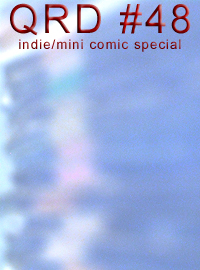
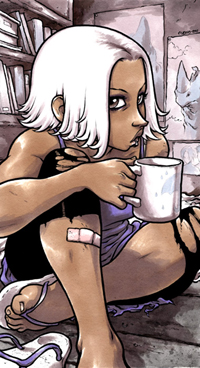
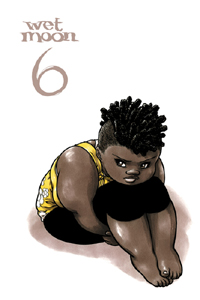
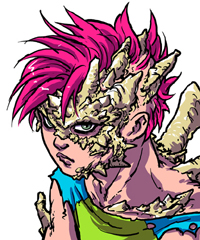
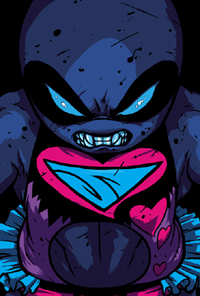
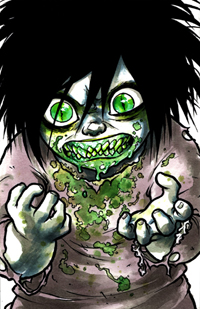
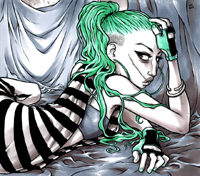




February 2011

City: Rochester, NY
Comics: Wet Moon, Shadoweyes, The Abandoned, Water Baby, Mountain Girl, Hack/Slash, Fraggle Rock, House of Mystery
Websites: www.greenoblivion.com, mooncalfe.deviantart.com, www.shadoweyes.net
QRD – How old were you when you first got into comics & did you always stick with them or did you come back to them?
Ross – I think I was around 8, I remember reading Calvin & Hobbes & old Ninja Turtles comics. I was into a lot of the early 90s Image stuff & then I got into Japanese comics, but I think I was into reading comics to varying degrees pretty much since elementary school.
QRD – What was the first comic book you ever bought?
Ross – I thought I knew this answer, but I recently discovered I was wrong. I thought it was #8 of the Archie Ninja Turtles series & I can’t remember exactly but recently I found out that the publication date of that issue was after the first live-action movie had been released which was in 1990, I was in 4th grade then & I was definitely reading the old Mirage TMNT at that point in the form of I had the colorized First Graphic Novel editions. Maybe my first book was Archie TMNT #8 somehow & I’m just getting the dates screwed up, but I’m not sure what my first comic book was.
QRD – How old were you when you put out your first comic?
Ross – About 22 or 23, I think.
QRD – What decade do you think produced the best comics?
Ross – “Best” is so relative & I’m totally biased on this because I grew up with the 90s, so I’m really attached to a lot of that stuff, good or bad. I guess I’d say comics are better than ever right now, but I have much, much less fun reading them now than I did in the 90s. Even 90s books I didn’t read as a kid & have no nostalgia for, I’ll read that stuff now as an adult & it still seems awesome to me regardless of its quality level.
QRD – Why comics instead of just writing or drawing?
Ross – I actually wanted to be a novelist, I even wrote a 300+ page incoherent sci-fi fantasy novel in high school, & through most of college I was still writing prose. I used to do comic strips as a kid but abandoned it & I didn’t really get into doing comics seriously, despite majoring in Sequential Art, until junior or senior year of college. I think something happened where I realized that I could achieve great subtlety with comics & that comics editing & framing is a lot like film editing & shot composition & I could do the things I wanted to do with comics that prose was unable to do. Obviously there are trade-offs & advantages & disadvantages to every medium, but so far comics has really worked for me.
QRD – Do you see mini-comics & indie comics as paths to mainstream comics or as their own unique media?
Ross – Depends on the individual person & what their personal goals are. Indie comics CAN be a path to mainstream books, they can get a person noticed by Marvel or DC; but they can also be a path unto themselves. People usually seem to define “path” as “money,” so I guess in that sense indie comics are a pretty good path to mainstream money. But creatively-speaking, no. There are also plenty of people who do both, I don’t think there has to be any division.
QRD – How many copies of your comic do you print in your first run?
Ross – Depends on the book in question & depends on the publisher. I’ve done really small print runs on my indie books, but then had much bigger ones for my DC & Tokyopop books. I actually don’t know the exact numbers of any of them, I try to stay out of that because it can be either discouraging or create too much pressure.
QRD – How much do you think comics should cost?
Ross – Depends on the book & the publisher. Pamphlet comics should obviously be priced differently than a book-form comic & they are. & I think it matters who the publisher is, too, & what their bottom line is & their level of production costs & all that, or whether the comic is self-published.
QRD – How many books do you produce a year & how many would you like to?
Ross – I do at least 1 a year, but it’s more like 1.5, I’ll do a whole book & then scripting & thumbnailing on another. In my best years I’ve done 2 whole 150+ page books in one year, in addition ancillary stuff like commissions & conventions. I’d love to do be able to do more; but I’m probably peaking at 2, I can’t imagine being able to do more than that!
QRD – Do you think stories should be serialized or delivered as complete works?
Ross – Depends on the book. Some stories work great in increments like that, like a TV show, but other stories are best in book format & would be made worse & warped by the rigidity of floppies. But I think at the end of the day a story justifies its own format.
QRD – How are comic strips different than comic books & which medium do you prefer?
Ross – Comic strips seem to be comics that aren’t in book form, that are usually broken up into little increments whether in a newspaper or webcomic, while comic books are a longer uninterrupted story. I don’t have a preference, it all depends on the material, like Calvin & Hobbes works perfectly as a strip comic; it’s exactly what it needs to be, but then something book format would probably suffer if broken up into strip form. It’s all a matter of what the material is conceived as.
QRD – How long is it from when you start a comic until it’s printed?
Ross – Depends on the book & the publisher. How long a book takes me to do really depends on how I’m drawing it, what the style is & what the media is, whether it’s traditional or digital & obviously how many pages it is. I guess on average an entire book takes me maybe 4-5 months to do, not including post-production/waiting for it to be printed & shipped. Then the publisher has to be taken into account, too, some smaller publishers have a super short post-production turnaround, I’ve had books released on the shelves anywhere from month after I’ve turned in the pages, to 2 years. There’s a lot of waiting in some cases. In terms of self-published stuff, I’ve had print times be a week at Kinko’s, to about a month at the usual printer I use.
QRD – What do you better with your comics now than when you first started?
Ross – Everything! :D
QRD – At what point in the artistic process do you work digitally?
Ross – Depends on the book, I’ve done entirely traditionally-drawn/toned stuff where the only digital step is scanning them into the computer, to artwork drawn completely digitally, to artwork that is about half & half.
QRD – What do you think of digital comics & webcomics?
Ross – Depends on the comic, I like some & some I don’t like. I think they’re just as valid as a traditionally-drawn printed comic & in the case of webcomics maybe even more important at this point in the industry.
QRD – Do you prefer working in color or black & white?
Ross – Definitely black & white. I’ve been doing more color stuff in the past few years but I still love doing monochromatic stuff & greyscale tones.
QRD – How many different people should work on a comic & what should their jobs be?
Ross – It totally depends on the book & what the book is & what it needs to be. Some books, like mine, are one-person operations, I do pretty much everything myself until I hand it over to my publishers who get it ready for the printers; while others are collaborations between an artist & writer which is also good, I’ve done some of that. Sometimes I think mainstream comics get a little crazy with how many people work on one issue of a comic, like they’ll have 12 inkers or something, but I guess whatever it takes to get the job done.
QRD – How do you find collaborators?
Ross – The writers I’ve worked with were through my publisher, & I’ve recently gotten hooked up with a writer through a friend/colleague. I’ve tried to get a few books going where I write for other artists & I found them through the internet & being mutual fans.
QRD – How tight do you think a script should be as far as telling the artist what to draw?
Ross – Depends on the script & how the writer likes to write & who the artist is. Some artists probably need tighter scripts than others & vice versa & some writers write super-tight/detailed scripts naturally, while others like to let the artists have more free rein. I don’t know, it varies, everybody’s different.
QRD – What comic book person would you be most flattered to be compared to?
Ross – Man, I don’t know... I’ve heard people say my book Shadoweyes reminds them of old Eastman & Laird Ninja Turtles comics which I guess is about as flattered as it gets for me. Even though I’d be flattered with any kind of lofty comparison, I’d rather not be compared to anyone.
QRD – What do your friends & family think of your comics?
Ross – My friends all seem to love them, but I’m not sure anyone in my family actually reads them, ha-ha.
QRD – What do you think of superheroes?
Ross – I like some, some I don’t. I think they’re as versatile & valid as any other genre/subgenre.
QRD – Marvel or DC?
Ross – I’ve always been way more into Marvel, mostly because of X-Men & my favorite superhero Sleepwalker.
QRD – What comic characters other than your own would you like to work with?
Ross – Teenage Mutant Ninja Turtles (which almost happened twice, but both times cruelly slipped through my fingers), Sleepwalker, Marrow, Angel Salvadore, or X-23. Silver Surfer would also be super fun, but I suck at drawing chrome, & I’d love to write my own She-Hulk book & make her hugely muscular like the male Hulk.
QRD – Ideally would you self-publish?
Ross – I’ve self-published small things before & it’s a lot of fun, I love having no editors or pressure looming over me! I think ideally I’d self-publish everything if I had the money, yeah.
QRD – What conventions do you try to attend & why?
Ross – I usually go to San Diego because that’s the big one, but recently I’ve been doing New York Comic Con & started going to Fan Expo in Toronto. I’ve been to a few others off & on over the years. I usually like to stick to ones closer to home & ones that I think I’ll make some money at, but especially ones where I can see my friends & maybe make some professional contacts.
QRD – What do you do to promote your books?
Ross – I use websites like deviantart & my blog, Twitter, stuff like that. It’s tough because it’s on me to do most of the promotion, the publishers I usually work with are small operations so they only are able to do anywhere from limited promotion to zero.
QRD – Do you think your comics are well suited to comic shops or would sell better elsewhere?
Ross – I think they tend to do better in bookstores & on websites like Amazon. It probably also depends on how a particular comic shop is run, too; some shops are really focused on Big Two comics almost to the exclusion of all else & are frequented by people really entrenched in that stuff, while other shops are really open & set up more like bookstores with a big range of books & obviously my stuff would do much better at the latter type of store.
QRD – What other medium would you like to see some of your comics made into (television, film, games, action figures, etc.)?
Ross – All of the above! Ha-ha.
QRD – Do you consider yourself a comic collector or a comic reader or both?
Ross – A comic reader for sure. I don’t keep things in bags or anything & most of the floppies I read I get rid of afterward unless it’s something I really like. & then book format comics are the same for me as novels, they’re there to read & if I don’t plan on re-reading them, I don’t keep them.
QRD – What do you see as the most viable mediums for comics distribution 10 years from now?
Ross – Hmm, I don’t know, I don’t think I’m anywhere near qualified to make that kind of prediction. I’d guess digital will get more & more important & more practical, but I’m not sure how that’ll be done.
QRD – What would you like to see more people doing with comics?
Ross – Reading them, haha.
QRD – Anything else?
Ross – Read my comics!!!







